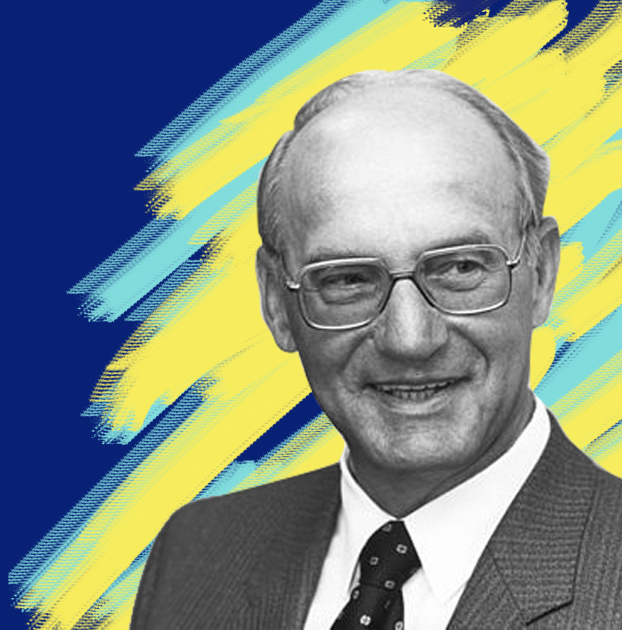At first glance, Paderborn¹ may seem an unexpected counterpart to today’s Silicon Valley, yet in the mid-20th century, North Rhine-Westphalia had its own IT and economic icon: Heinz Nixdorf. From humble beginnings, Heinz Nixdorf developed his company based in Paderborn into a pioneer in computer technology. At the same time, his commitment to education, infrastructure, and sports left a lasting impact on the city.
On this anniversary of his birth, we take a look at the life and work of this versatile personality and his enduring significance for contemporary society.
¹ The city of Paderborn, with over 156,000 inhabitants (as of 2023), is a major city in the eastern part of the state of North Rhine-Westphalia in Germany.
Why do we actually write about tech pioneers? As in many companies, our meeting rooms have been given names – and what could be more fitting for an IT company than to name the rooms after deserving men and women of technology history who paved the way for the innovations we use today. In doing so, we not only remember their important contributions but also draw inspiration from their legacy as we continue to push the boundaries of what is possible in modern technology.
The birthplace of the tube computer
Heinz Nixdorf, born on April 9, 1925, came from humble beginnings, shaped by Germany’s economically challenging situation during his childhood and youth. Through scholarships, Heinz Nixdorf was able to attend a higher school. Subsequently, he studied physics and business administration but discontinued his studies in 1952 to become self-employed. In the same year, the “Labor für Impulstechnik” (Laboratory for Pulse Technology) was established in a basement workshop in Essen, where the first computer, still equipped with tubes, was developed. This tube computer could process data stored on punch cards. Nixdorf was already convinced at that time of the future significance of computer technology.
The success story of the Nixdorf Computer AG
The basement workshop quickly became too small, prompting Nixdorf to relocate the company to his hometown of Paderborn in 1959. From there, Heinz Nixdorf developed his company into a pioneer of the IT industry. Not only was the first printing electronic desktop calculator manufactured in Paderborn, but Nixdorf also significantly influenced the further development of computer technology both domestically and internationally. By the mid-1960s, Heinz Nixdorf AG introduced user-friendly and compact computer systems to the market. The invention of the first small semiconductor-based computer in 1965 was a decisive milestone for the company.
Icon of the German Economic Miracle

Heinz Nixdorf was not only a successful entrepreneur but also a visionary possessing exceptional foresight. He recognized early on the potential of workplace-oriented computer systems, thus enabling medium-sized companies to access this technology and paving the way for decentralized electronic data processing. Nixdorf’s company grew steadily and effectively positioned itself against market competitors. Thanks to the tremendous success of his innovations, he became a symbol of the German Economic Miracle. By 1986, Nixdorf employed approximately 23,000 people worldwide, and his company’s revenue amounted to around 4 billion Deutsche Marks.
Paderborn as a center of information technology
In addition to his impact on the German economy, Heinz Nixdorf also demonstrated a strong commitment to his hometown of Paderborn. His efforts led to the founding of a focus on computer science at the local university and the establishment of computer centers in schools. Furthermore, he consistently advocated for improvements to the transportation infrastructure in Paderborn and actively campaigned for their implementation, including several highway access points.
A legacy for the future
Heinz Nixdorf passed away in 1986 at the age of 60 from a heart attack. Following his death, the company continued to operate independently. Heinz Nixdorf AG was taken over by Siemens in 1990 and transformed into “Siemens-Nixdorf Informationssysteme AG”. In 1999, it was fully integrated into Siemens AG, resulting in the disappearance of the “Nixdorf” brand from the company’s name. In Paderborn, Nixdorf’s legacy lives on: The former company building houses the world’s largest computer museum, where visitors can experience the history, present, and future of information technology. During his lifetime, Nixdorf also established two foundations, the Heinz Nixdorf Foundation, and the Westphalia Foundation, dedicated to continuing his legacy.
Fun Fact:
Apart from his success as an entrepreneur, Heinz Nixdorf was a passionate athlete who devoted himself to both track and field athletics and sailing. Beyond his personal interests, he actively engaged in Paderborn and played a significant role in the realization of the still-existing sports park “Ahorn-Sportpark”.
>> Other articles you might be interested in:
When ones and zeros were still holes: Herman Hollerith and the invention of the tabulating machine
- Built for Live Sports Arena Operations: How KVM Supports Game Day Performance - 12. February 2026
- G&D and VuWall honor outstanding partners at ISE 2026 - 5. February 2026
- Future-Proof Control Rooms: STADLER SYSTEC Relies on G&D Solutions - 30. January 2026


